Kuwait supports essential health care service availability in Syria with additional US$3 million
12 August 2021, Damascus, Syria – WHO welcomes a new donation from the Kuwait Fund For Arab Economic Development to support health care for all people in need in Syria. This new contribution of US$ 3 million comes at a critical time as the health system faces shortages in resources due to sanctions and is overwhelmed by the ongoing COVID-19 pandemic.
“Kuwait has been a long-standing partner to WHO in our work to save the lives of the Syrian people. We are grateful for this generous contribution that has come as a major step towards reviving the availability of health care services to all people in need, and supports WHO’s commitment to alleviate the immense suffering of the Syrian people,” said Dr Akjemal Magtymova, WHO Representative and Head of Mission in Syria.
Gaps in local production of medicines within Syria have left significant shortages in much needed essential medicines, especially for patients with chronic conditions. Noncommunicable diseases are now the highest cause of morbidity in Syria, accounting for 45% of all deaths in the country. This new funding will enable WHO to increase access of vulnerable people to life-saving treatment for noncommunicable diseases, including asthma and chronic pulmonary conditions, cancer, cardiovascular disease, diabetes and kidney failure.
With this generous support, WHO will also continue strengthening the COVID-19 response, as well as support the national immunization programme in the implementation of COVID-19 vaccination campaigns targeting high-risk groups, including internally displaced people and host communities.
Part of the funds will also be used to purchase 5 fully equipped ambulances that will boost national efforts to strengthen the management of trauma cases, increase access to health care services, and facilitate transportation and referral of emergency cases among internally displaced people and host communities to the nearest health facility. As the crisis enters its eleventh year, 6.1 million people remain internally displaced and are at increased risk of infectious diseases due to limited access to safe water and sanitation, overcrowding and other risk factors. In Syria today, there are cases of epidemic-prone diseases like acute diarrhoea, leishmaniasis, and suspected hepatitis.
As of June 2021, only 47% of public hospitals are fully functioning, resulting in access to health services to millions being crippled. Shortages of trained health workers are very visible on the ground, as a result of more than a decade of war, and a declining economic situation.
“Syria is experiencing a protracted political and socioeconomic crisis that has resulted in a severe deterioration of living conditions. The scale, severity and complexity of humanitarian needs remain extensive. The health system has taken a devastating blow as a direct result of the crisis and aggravated by the sanctions coupled with the ongoing COVID-19 pandemic. Long-standing partners to WHO, such as the Government of Kuwait, help WHO ensure that health care services to all vulnerable Syrians continue uninterrupted, and help us fulfil our common vision of universal health coverage and health care for all by all,” added Dr Magtymova.
Updates on COVID-19 vaccination in Syria, August 2021
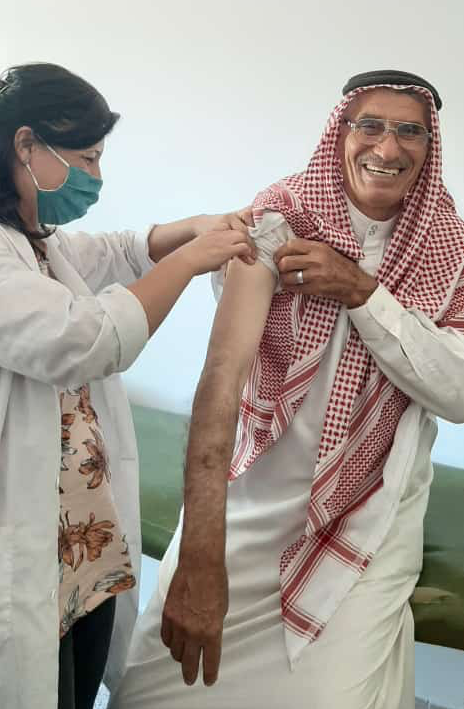 11 August 2021 – More than 355 500 total doses of COVID-19 vaccines have been administered in Syria as of 9 August as part of ongoing efforts to protect priority groups and control virus transmission. This includes 55 500 doses administered in northwest Syria and 19 354 doses administered in northeast Syria.
11 August 2021 – More than 355 500 total doses of COVID-19 vaccines have been administered in Syria as of 9 August as part of ongoing efforts to protect priority groups and control virus transmission. This includes 55 500 doses administered in northwest Syria and 19 354 doses administered in northeast Syria.
This coverage reflects less than 1% of the total population who have been vaccinated with one dose and 0.6% who are fully vaccinated, making Syria one of the countries with the lowest vaccine coverage globally.
“In line with WHO recommendations, Syria’s vaccination strategy aims to first reach people who are more at risk of serious illness if infected with COVID-19. WHO is working with national health authorities to regularly review and update Syria’s national plan to deploy vaccines and deliver them to identified target populations, taking into account anticipated limited supplies,” said Dr Akjemal Magtymova, WHO Representative and Head of Mission in Syria.
Three main groups are prioritized for vaccination: health care workers, people over 55 years of age, and people with chronic diseases. Other priority groups included internally displaced people living in camps, prisoners, and teachers. In northwest Syria, vaccination teams are initially prioritizing health care workers as per the vaccination strategy.
An additional 2.36 million doses of vaccines are expected to be delivered to Syria over several consecutive shipments in the coming months through the COVAX Facility, including 493 680 doses allocated for northwest Syria. This is a substantial increase in the supply of vaccines, but still not enough to reach the target 20% of the population planned to be vaccinated by end of 2021 as per the national vaccine deployment plan.
National health authorities are conducting trainings for different categories of service providers to cope with the expected surge in supply and demand for COVID-19 vaccines. In parallel, WHO is increasing knowledge and awareness of COVID-19 vaccines among health workers across the country through printed materials, face-to-face sessions, and community dialogues, with a special focus on health staff working in camps hosting internally displaced people in northeast Syria.
To address vaccine hesitancy and increase demand, WHO is strategizing new means to reassure the public that the vaccine is both safe and crucial against the spread of COVID-19. WHO is working with the Ministry of Health and UNICEF to support a mass public information campaign planned to start in mid-August. The campaign aims to reach different groups such as the elderly, health workers, and students through community leaders, influencers, and online and off-line channels that address key issues, including side effects, the vaccine registration process, and correcting misinformation.
“My Hero is You” mental health campaign enhances resilience among parents and children in Syria
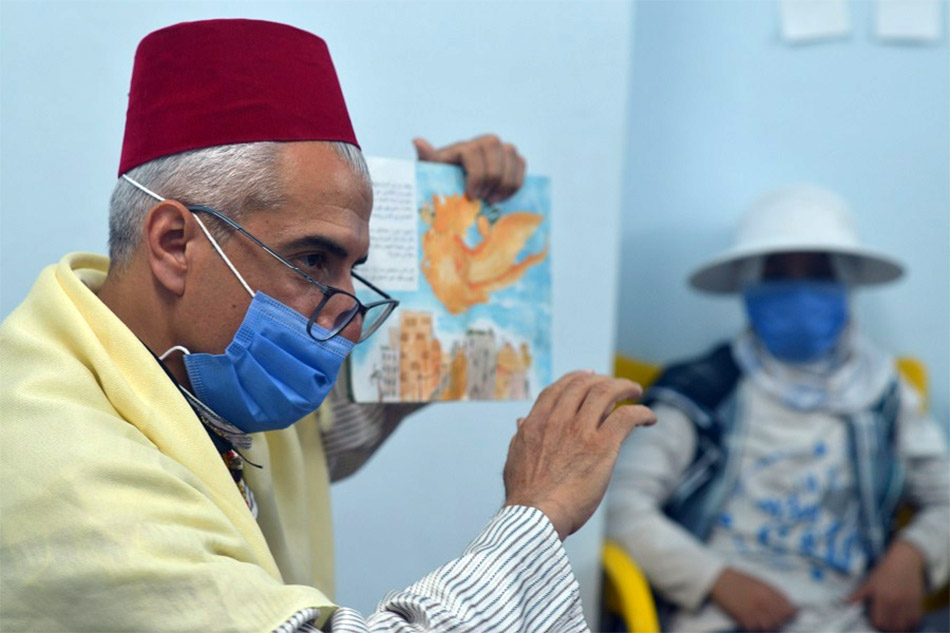
8 July 2021, Damascus – One in 10 people in Syria live with a mild to moderate mental health condition. Prolonged exposure to conflict and the COVID-19 pandemic have continued to strain the mental well-being of families. In response, WHO Syria and local nongovernmental organizations in Rural Damascus recently launched the “My Hero Is You” campaign, which aims to reduce anxiety and fear associated with COVID-19 among children, and enhance the ability of parents to effectively talk to children about their well-being.
The pilot campaign reached 5000 children and included messages about how to cope with stress delivered through a colouring book. The book was adapted to the Syria context and is based on a children’s story, entitled “My Hero is You”, developed by WHO and other members of an United Nations inter-agency committee on mental health and psychosocial support in emergency settings. The campaign also included the provision of psychosocial support sessions and focus group discussions, attended by 2000 parents, caregivers and health educators who discussed their concerns, coping mechanisms and support strategies for children experiencing stress in the context of the COVID-19 pandemic.
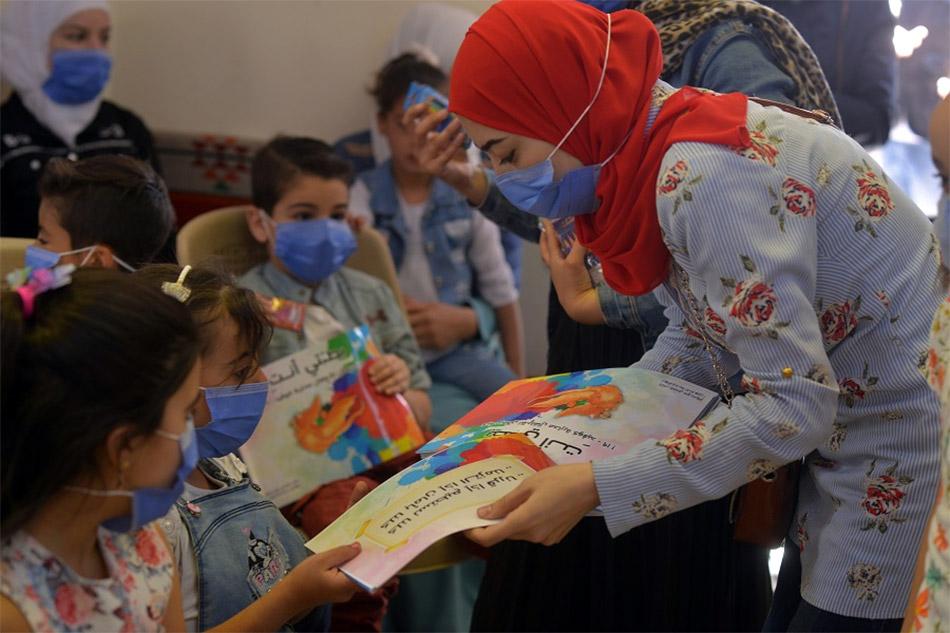
“In recent years, there has been increasing acknowledgement of the role of mental health in people’s overall well-being and, especially, children’s development. In Syria, the conflict was exacerbated by the COVID-19 pandemic and its adverse economic impact, so the need to address mental health has become even more acute. Thus, our increased focus on mental health aims at listening to communities – to their fears, concerns and experiences of coping with COVID-19 - and empowering them with tools and skills to stay mentally resilient and adapt to a new normal,” said Dr Akjemal Magtymova, WHO Representative in Syria.
The campaign, funded by the Solidarity Response Fund, was made possible thanks to partnerships with Al-Tal and Al-Qutayfah nongovernmental organizations, members of which received training by WHO prior to the campaign launch. The training was based on the WHO global package and adapted to the Syrian context to tailor it to the current needs of community workers who provide basic psychosocial support services to parents and children.
“I am proud to be part of the initiative through which I could teach parents and children how to overcome anxieties and stay positive despite the circumstances surrounding them. It was a joy to observe children reading and colouring the story and imagining themselves travelling around Syria with characters, like Ario, to share with other children what they have learned from the book and what to do to prevent transmission of COVID-19,” said Ahmed Sousan, 30, a volunteer from Rural Damacus who received WHO training.
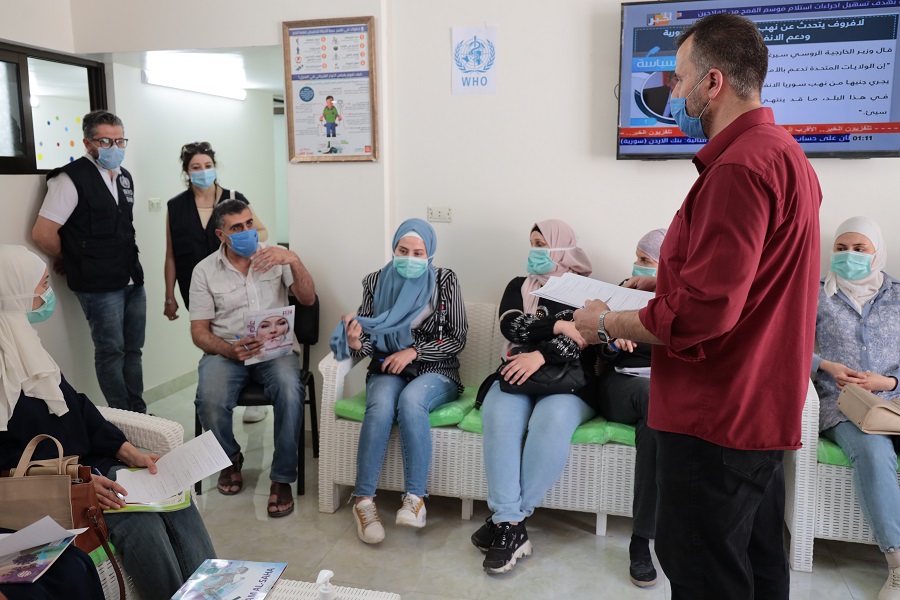
“Maintaining a healthy lifestyle and work life balance were among the recommendations I received during the psychosocial support sessions, in addition to tips on how to talk to children about COVID-19 related fears. It was important for me to share how the pandemic affected the mental well-being of my family. I felt others shared the same concerns and together we can overcome the challenges of the current times,” said one of the parents at the Al-Tal centre.
Following the success of the pilot programme in Rural Damascus, WHO plans to replicate the initiative in Homs, Aleppo and other governorates this year to reach thousands of parents and children in need of mental health support; and in collaboration with the Regional Office for Eastern Mediterranean will also share the initiative’s best practices for other countries in the Region to replicate.
Media contact
Gulalek Soltanova
External Relations/Communications Officer
WHO Syria Office
Damascus, Syrian Arab Republic
+963 953 888 477
Commit to quit: WHO supports people quitting tobacco to have a healthier and brighter future
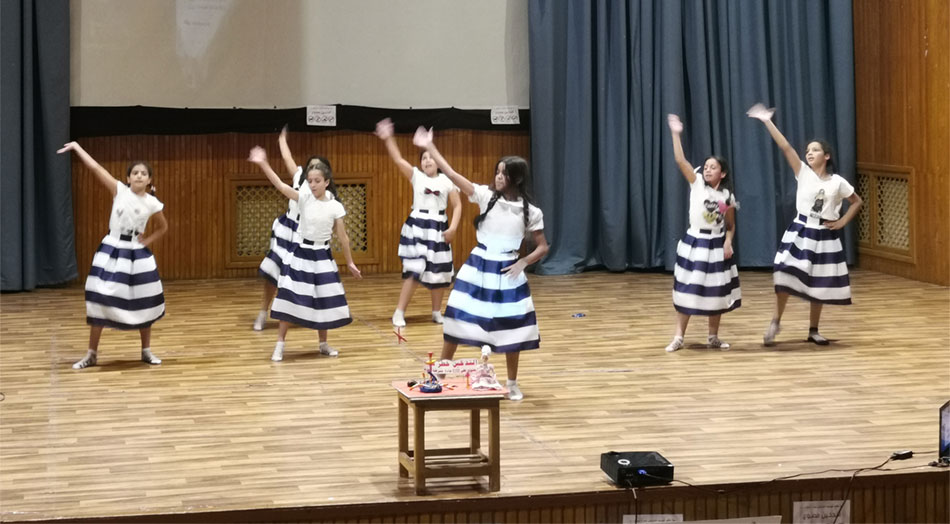
10 July 2021, Damascus – On World No Tobacco Day in late May, the Syrian Ministry of Health in coordination with WHO organized an exhibition of paintings and sketches by children under the theme of “Tobacco Kills”. The exhibition was organized within the context of the WHO campaign “Commit to Quit” and complemented by performances by children of short plays and educational songs, and displays that highlight the shattering consequences of tobacco products, in all forms, on health. A workshop for tobacco control programme coordinators was held prior to the event, and 2 additional workshops were conducted for media representatives on World No Tobacco Day.
Activities were designed with children, adolescents, adults, media and health professionals in mind, in a bid to raise awareness of the harm of tobacco and smoking and the importance of quitting within the community.
“We invite all to play their role by joining the WHO campaign and having a tobacco-free environment that gives people the facts, support and tools they need to quit tobacco,” said Dr Akjemal Magtymova, WHO Representative in Syria.
Syria has recently witnessed an increase in tobacco product consumption, particularly among youths. In response, WHO has supported an increase in the number of tobacco control clinics run by the Ministry of Health, from 13 in 2020 to 24 this year. “These clinics provide free medical advice, and psychological and medical support to smokers who decide to quit,” explains Dr Abeer Obid, Director of the Tobacco Control Programme at the Ministry of Health.
The “Tobacco Free School” initiative was launched in 2018 specifically for target youths. The initiative targeted 42 schools in several Syrian governorates. Other initiatives were launched, such as “Determination and Stability”, which targeted 10 000 young men and women at universities over a 2-month period. “Let the Change Start with You” campaign involving the youth in juvenile centres and orphanages; and “Peer Education” initiative influening smokers through their colleagues.
Smokers are more likely to contract COVID-19 than those who do not smoke. The virus also proves more fatal among smokers. These risks run parallel to an array of others, including the development of cancer, heart disease and respiratory illnesses. Tobacco kills more than 8 million people a year worldwide, 7 million of which are smokers and 1.2 million of which are non-smokers exposed to second-hand smoke.
WHO Syria Marking World No Tobacco Day 2021
Media contact
Gulalek Soltanova
External Relations/Communications Officer
WHO Syria Office
Damascus, Syrian Arab Republic
+963 953 888 477


